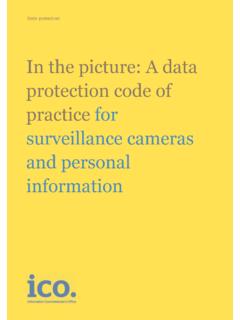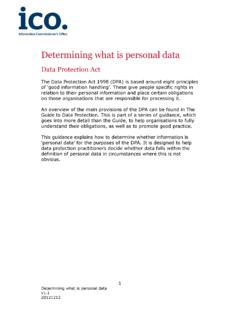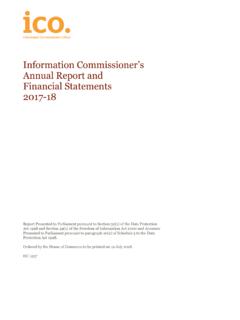Transcription of Safeguarding national security (Section 24) - ICO
1 ICO lo Safeguarding national security . ( section 24). Freedom of Information Act Contents Overview .. 2. What FOIA says .. 2. Exemption from the duty to communicate .. 3. national security .. 3. Required for the purpose of .. 4. Sections 24(1) and 23(1) are mutually exclusive .. 7. section 24(2) neither confirm nor deny exemption from the duty to confirm that the information is held .. 7. Sections 23(5) and 24(2) are not mutually exclusive .. 8. Public interest test and section 24 .. 9. The public interest in maintaining the section 24 exemptions .. 9. Public interest in disclosing the information .. 10. The public interest of the UK .. 11. The Commissioner's approach to complaints .. 12. Ministerial certificates .. 13. Other considerations .. 14. More information .. 14. 1. The Freedom of Information Act 2000 (FOIA) gives rights of public access to information held by public authorities 2. An overview of the main provisions of FOIA can be found in The Guide to Freedom of Information.
2 3. This is part of a series of guidance, which goes into more detail than the Guide to help public authorities to fully understand their obligations and promote good practice. 4. This guidance forms part of a suite of complementary guidance along with section 23' and How sections 23 and 24 interact'. which should be read together. 1. Safeguarding national security ( section 24). 20120910. Version : 5. This guidance explains to public authorities how the exemption in section 24 works to protect national security . Overview section 24(1) provides that information is exempt if exemption from section 1(1)(b) is required for the purposes of Safeguarding national security . o national security includes more than the security of the UK, its military defence and its systems of government, it also involves co-operation with other states in combating international terrorism and guarding against actions targeted at other states which may impact on the UK and its people. o Required for the purposes of is interpreted as meaning reasonably necessary.
3 O Although there has to be a real possibility that the disclosure would undermine national security , the impact does not need to be direct or immediate. section 24(2) provides an exemption from the duty to confirm information is held, where the exemption is required for the purposes of Safeguarding national security . section 24 is subject to the public interest test. It is the interests of the UK and its citizens that are of concern. What FOIA says 6. section 24 states: (2) Information which does not fall within section 23(1) is exempt information if exemption from section 1(1)(b) is required for the purposes of Safeguarding national security . 2. Safeguarding national security ( section 24). 20120910. Version : (2) The duty to confirm or deny does not arise if, or to the extent that, exemption from 1(1)(a) is required for the purpose of Safeguarding national security . Exemption from the duty to communicate 7. In broad terms section 24(1) allows a public authority not to disclose information if it considers releasing the information would make the UK or its citizens more vulnerable to a national security threat.
4 To understand the exemption better it is important to look more closely at the language used. national security 8. There is no definition of national security . However in Norman Baker v the Information Commissioner and the Cabinet Office (EA/2006/0045 4 April 2007) the Information Tribunal was guided by a House of Lords case, Secretary of State for the Home Department v Rehman [2001] UKHL 47, concerning whether the risk posed by a foreign national provided grounds for his deportation. The Information Tribunal summarised the Lords' observations as follows: national security means the security of the United Kingdom and its people;. the interests of national security are not limited to actions by an individual which are targeted at the UK, its system of government or its people;. the protection of democracy and the legal and constitutional systems of the state are part of national security as well as military defence;. action against a foreign state may be capable indirectly of affecting the security of the UK ; and reciprocal co-operation between the UK and other states in combating international terrorism is capable of promoting the United Kingdom's national security .
5 3. Safeguarding national security ( section 24). 20120910. Version : Required for the purpose of 9. The exemption applies where withholding the information is required for the purposes of Safeguarding national security . Required is taken to mean that the use of the exemption is reasonably necessary. Required is defined by the Oxford English Dictionary as to need something for a purpose' which could suggest the exemption can only be applied if it is absolutely necessary to do so to protect national security . However the Commissioner's interpretation is informed by the approach taken in the European Court of Human Rights where interference to human rights can be justified where it is necessary' in a democratic society for Safeguarding national security . Necessary' in this context is taken to mean something less than absolutely essential but more than simply being useful or desirable, so we interpret required', in this context, as meaning reasonably necessary'. 10. This approach was articulated in ICO decision notice FS50178276 which concerned a request to the Metropolitan Police for information on a terrorist plot to attack London.
6 The Commissioner found that the term requires: means reasonably necessary. It is not sufficient for the information sought simply to relate to national security ; there must be a clear basis for arguing that disclosure would have an adverse effect on national security before the exemption is engaged.. This approach was also endorsed by the Information Tribunal in Philip Kalman v Information Commissioner and the Department of Transport (EA/2009/0111 8 July 2010). 11. It is not necessary to show that disclosing the information would lead to a direct or immediate threat to the UK. In a time of global terrorism our national security can depend on cooperating with others. This can involve protecting allies, cooperating with other countries in the fight against terrorism, as well as building relations with other prospective allies. This means that the exemption can be engaged to prevent a disclosure that would have adverse consequences for one of these partners even if disclosure would not result in a direct or immediate risk of attack on the UK or its citizens.
7 12. Support for this approach is taken from Secretary of State for the Home Department v Rehman [2001] UKHL 47, the case concerning the deportation of a foreign national . Lord Slynn found that: 4. Safeguarding national security ( section 24). 20120910. Version : To require the matters in question to be capable of resulting directly' in a threat to national security limits too tightly the discretion of the executive in deciding how the interests of the state, including not merely military defence but democracy, the legal and constitutional systems of the state need to be protected. I accept that there must be a real possibility of an adverse effect on the United Kingdom for what is done by the individual under inquiry but I do not accept that it has to be direct or immediate.. 13. Safeguarding national security also includes protecting potential targets even if there is no evidence that an attack in imminent. Example In the ICO decision notice FS50308040, the Commissioner considered a request to West Yorkshire Fire and Rescue Service (WYFRS) for the details of its fleet of vehicles.
8 WYFRS operated the national Control Centre for fire and rescue services which coordinates incidents of national significance. The request had been refused on national security grounds. WYFRS argued that disclosing the information would provide sufficient information for someone to clone its vehicles. This would provide a means for its headquarters, to be infiltrated. Although there was no evidence presented that an attack was being planned, the Commissioner accepted that the control centre was a realistic target and that the explanation of how the information could be used was plausible. Therefore the Commissioner found s24(1) was engaged. 14. The Commissioner also recognises terrorists can be highly motivated and may go to great lengths to gather intelligence. This means there may be grounds for withholding what seems harmless information on the basis that it may assist terrorists when pieced together with other information they may obtain. 5. Safeguarding national security ( section 24).
9 20120910. Version : Example In Peter Burt v Information Commissioner and the Ministry of Defence (EA/2011/0004 20 September 2011) the First Tier Tribunal found that disclosing the report of a visit by officials to an enriched uranium facility in the United States could undermine national security . The Ministry of Defence was concerned that the technical information could assist those who wished to make their own nuclear weapons. The First-tier Tribunal accepted that there was a risk that this technical information could be combined with other information to provide a complete picture of how to build a nuclear device. Example In the ICO decision notice FS50368290, the Commissioner considered a request to the Metropolitan Police Service for the previous year's cost of the Royal Protection Unit. The police argued that the information could be compared to other information, in the public domain, and that this would provide terrorists with intelligence on the relative vulnerabilities of members of the Royal family.
10 15. Although mosaic arguments arise when considering other exemptions the issue in these cases is whether combining the requested information with other information in the public domain will cause harm. In section 24 cases, the issue extends to whether the requested information will be useful if combined with other information that terrorists may already have or could obtain. 16. It may be harder to say what additional information terrorists have access to or what they may pick as a target. This means it may be difficult to justify the application of section 24 in some cases. However, the Commissioner will consider each case on its own merits and the public authority will always need to be able to explain why it believes disclosing the information could harm national security . 6. Safeguarding national security ( section 24). 20120910. Version : Sections 24(1) and 23(1) are mutually exclusive 17. section 24(1) can only be applied to information that does not fall within section 23(1).









